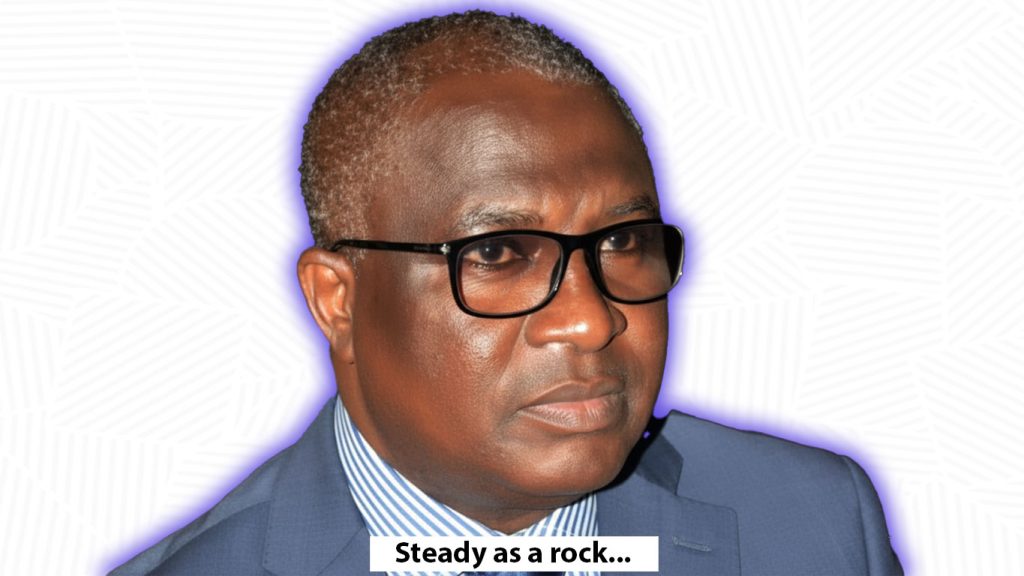Aparutu and His Life Coach
By Azu Ishiekwene
- October 23, 2025
- 10:21 am

Putting it nicely, Aparutu is the Yoruba word for a joker, a clown. In August 1986, when I first arrived at the wooden, fabricated office of PUNCH in Kudeti, Ikeja, Lagos, for a vacation job, that was how the editor then, Alhaji Najeem Jimoh, referred to me: Aparutu.
He wasn’t being mean or harsh. That just happened to be one of his favourite words. And maybe I looked the part, too. Skinny and frail, I was only a part two student of Mass Communication at the University of Lagos, chafing under the strictures of school life. I made a little money contributing to The Guardian’s Op-ed pages and wanted a bit more.
In the beginning…
Dr Olatunji Dare, who had given me a leg up with access to The Guardian, gave me a note on the back of his complimentary card for a vacation job to his friend, Alhaji. I showed up in PUNCH holding the card like an egg. One look at me, and Alhaji took the card and parcelled me off to his deputy by screaming through the glass louvres on the corridor partitioning off the newsroom: “Demola, Aparutu yi ni pe oun fe se journalism o…jo, ba mi wa bi kan fun!” Translation: “Demola, this clown says he wants to be a journalist. Please find a place for him.”
That was how I met Mr. Ademola Osinubi, then deputy editor. He was clean-shaven, spotlessly dressed and jovial.
CLICK HERE TO SUBSCRIBE TO MY WEEKLY NEWSLETTER
At the shop
Although Alhaji was the editor, Osinubi ran the shop, as I observed during my three-month vacation job. I later learnt that Alhaji trusted him to do the job based on his outstanding career as a reporter covering the airport and Lagos metro. Peter Ezeh and Dipo Onabanjo played significant roles in deepening my interest in journalism at the time, but Osinubi signed off on my first Page One story.
I had received a tip-off about an expatriate Volkswagen Nigeria staff member who died in Lagos while boating, and filed the story. I overheard a brief discussion about whether it was strong enough for the daily, and Osinubi said, since it was exclusive, it would lead the Evening PUNCH and feature on the cover of the main title the next day. I couldn’t believe it! I had landed my first Page One story as an intern.
When I picked PUNCH at the vendor’s newsstand in Ajegunle the next day and found my story on the cover, I ran excitedly past the bus stop where I was supposed to board a danfo.
Second coming
My return to PUNCH three years later for a full-time job was even more eventful. While rounding off my youth service in Okogbe, Ahoada, Rivers State, I wrote a piece published in The Guardian and PUNCH, entitled “I Will Find a Job.” Osinubi had become the editor, and Chris Mammah, his deputy.
Osinubi sent me a note through the Port Harcourt office, asking me to forget about The Guardian. “You already have a job at PUNCH,” he said. He was as good as his word.
The problem was that PUNCH was struggling. The turmoil following the death of the founding chairman, Chief Olu Aboderin, two years before I joined, had left the future of the business hanging by a thread. After Chief Moyo Aboderin, Chief Ajibola Ogunshola was appointed chairman of the Board. Those early years tested the company’s soul and the board’s ingenuity.
You could hardly miss the glare of the tussle, even as a reporter, but it was, quite frankly, not our concern. Osinubi and his colleagues at the top shielded the newsroom and, just like Alhaji, his boss and predecessor, they made PUNCH fun for reporters despite the dark clouds.
CLICK HERE TO SUBSCRIBE TO MY WEEKLY NEWSLETTER
A lateral move
I’ve said elsewhere that Osinubi gave me my first job as a journalist, but Bola Bolawole, the Features Editor, discovered my future. When Bolawole requested my reassignment from the newsroom to the Features department early in my career, Osinubi yielded reluctantly. He insisted, however, that I cultivate my reportorial instincts to succeed as a features writer. He was right.
Moving from the newsroom to features didn’t mean moving from his watchful care. He felt a duty to transform this Aparutu into something more, which came to fruition for most of my 21 years at PUNCH. Whether it was my reassignment from Features to the Editorial Board, or my subsequent appointments as Editor of Saturday PUNCH, then Editor of The PUNCH, and finally Controller of Publication and Executive Director, Publications, Osinubi had a nurturing hand in it.
If I know anything about a newspaper’s look and feel, production, standing firm against the bullying of advertisers, and managing a newspaper on a shoestring budget, Osinubi taught me. He led from the front whenever there was a trade war (and there were several in those days) between the company and middlemen or agents, or between the company and some rogue drivers who converted the company’s distribution vans for commercial use. The interest of PUNCH and his integrity were always first.
‘Sa a ma wo n’tie!’
He also taught me how to dodge a bullet or strategically dither, not by making a fuss, but by saying, “Sa a ma wo n’ti e.” Whenever he said that, which is the Yoruba for “You just watch,” be sure he will not move a finger – or immediately decide one way or the other.
When he joined PUNCH as a reporter in 1976, he had only a certificate from the Nigerian Institute of Journalism (NIJ). Many years later, and despite the incredible demands of his office, he took not just a first degree, but also an LL.M. in Law.
Every great editor has a legend. It wasn’t different with Osinubi, a reporter’s reporter, an editor’s editor and a manager’s manager. Tempered by age and experience, he comes across today as a gentleman’s gentleman. It wasn’t always so.
‘Boys will be boys!’
In his early days in the newsroom, he was, to put it mildly, a tough guy. He once squared off with the news editor, Tayo Kehinde, forcing the Managing Editor, Sam Amuka (also known as Uncle Sam), to remove him the next day after the altercation. Osinubi moved on happily and joined the Lagos office of Tide, under the leadership of Tayo Osiyemi. But Kehinde would have none of that. He set aside his ego, begged Uncle Sam and went straight to the Tide Lagos office to recall Osinubi. The newsroom, Kehinde reportedly said, would collapse without Osinubi.
At 70 now, those days must look to him like the wild, wild youth. Boys will be boys!
Alchemists at work
The chemistry between Osinubi and Ogunshola, who gave PUNCH a second life, was unmistakable. The former is ultra-conservative, often slow to act, and deeply risk-averse; the latter is a bean counter at heart, a logician and quick to execute once he is convinced of the facts and evidence.
The extraordinary success of PUNCH (consolidated over the years) lies in the incredible chemistry of both men, with the support of a board, which also benefited greatly from the shrewdness and experience of members like Dr Lekan Are, amongst others.
If this story reads like a chapter from The Osinubi of PUNCH, it is because he dedicated 45 years of his life to the company, 27 of which he spent as Managing Director/Editor-in-Chief. As we say in my neck of the woods: It’s one Osinubi, one PUNCH.
KYM!
I don’t know if he has succeeded in redeeming Aparutu. But without a doubt, he gave his best to PUNCH and even renamed me “King Yellow Man,” often calling me with such mirth and fondness that it is hard to miss the resonance in a million echoes!
Happy 70th birthday, Sir!
CLICK HERE TO SUBSCRIBE TO MY WEEKLY NEWSLETTER
Ishiekwene is the Editor-In-Chief of LEADERSHIP and author of the new book A Midlifer’s Guide to Content Creation and Profit.
If you liked this article, please use the buttons below to share:




